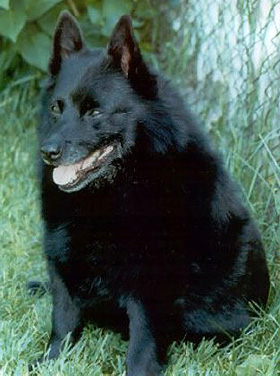
Schipperke
Group: Non-Sporting Dogs
Origin: Belgium
Height: 11 to 13 inches at the withers
Weight:
– Males: 15 to 18 lbs.
– Females: 11 to 15 lbs.
Pronounced: “skipper-key”

Ch. Count Nifty O’Marpeg CDX, TT
Photo credit: Majekin Perm Reg’d Schipperkes
CLICK HERE to View Breeder Listings
Breed Profile
The Schipperke has been known for centuries in the Flemish Province of Belgium where he was bred as a watchdog and hunter of vermin.
He is a bright, active and inquisitive dog that makes an excellent family companion. He is very good with children and suspicious of strangers, making him a good watchdog. Smart, loyal and loving, the Schip needs attention and companionship. He is active and loves to learn, and will excel in such activities as obedience, agility, flyball, tracking and herding.
In appearance, the Schipperke is a small, compact dog with a distinctive double coat that is shiny and slightly harsh. He also wears a ruff, cape and culottes. In North America, the only permitted colour is black. He has a fox-like head with an expression of mischief and impudence but never wild or aggressive looking.
Health Issues
In general, Schipperkes are a very healthy breed and long lived. Epilepsy, Legges-Perthes disease and thyroid problems have been known to occur occasionally in the breed but the incidence of these problems is fairly low.
There is, however, a new genetic disease that has been identified in the breed: Mucopolysaccharidosis type IIIB (MPS IIIB), also known as Sanfilippo syndrome type IIIB. The disease is fatal but a test has been available since April 2003 and all breeding stock should be tested along with any dog showing symptoms.
If you are considering the adoption of a Schipperke puppy, or any breed, it is very important to be selective in choosing a responsible and reputable breeder. Ensure that the prospective puppy’s parents have all health clearances. Breeding of any dog should not be done until after they have been proven to be free of evidence of significant hereditary diseases. (For more information on selecting a breeder, see the articles on the main General Information page.)
Additional Health Resources:
- Mucopolysaccharidosis type IIIB (MPS IIIB) in Schipperkes and DNA testing — For details about the disease and testing information.
- Canine Health Information Center (CHIC) — Schipperke — Providing a source of health information for owners, breeders, and scientists that will assist in breeding healthy dogs. CHIC is a centralized canine health database jointly sponsored by the AKC/Canine Health Foundation (AKC/CHF) and the Orthopedic Foundation for Animals (OFA).
- Health and Nutrition — Growing section of the Canada’s Guide to Dogs website which includes information on several health and nutrition related issues.
- AKC Canine Health Foundation — Working towards developing scientific advances in canine health.
- Canine Eye Registration Foundation (CERF)
- Orthopedic Foundation for Animals (OFA)
- Ontario Veterinary College (OVC)
- University of Pennsylvania Hip Improvement Program (PennHip)
- HealthGene — HealthGene Corporation is the leading provider of veterinary DNA diagnostic services in Canada.
- Labgenvet — Laboratory of Veterinary Genetics is a Canadian diagnostic laboratory that offers a comprehensive service of DNA tests for veterinary genetic diseases.
Grooming Information
- Grooming — This section of the Canada’s Guide to Dogs website includes tips, articles and information covering all aspects of dog grooming along with a listing of Groomers from across Canada.
Training Resources
- Training — For training information, see this growing section of the Canada’s Guide to Dogs website for tips, articles, as well as listings of training centres across Canada.
Additional Information
- Schipperke Pedigree Database — from Bonchien
- Clubs, Sports & Activities — For information on the many sports and activities you can get involved in with your dog.
- Working Dogs — The Working Dogs section of the Canada’s Guide to Dogs website provides information and listings of organizations that are involved in various dog jobs, such as Guide Dogs, Therapy Dogs, Police Dogs, Protection Dogs, and much more.
*NOTE 1: CHIC – The Canine Health Information Center “is a database of consolidated health screening results from multiple sources. Co-sponsored by the Orthopedic Foundation for Animals (OFA) and the American Kennel Club (AKC) Canine Health Foundation, CHIC works with parent clubs to identify health screening protocols appropriate for individual breeds. Dogs tested in accordance with the parent club established requirements, that have their results registered and made available in the public domain are issued CHIC numbers.” To learn more, visit: www.caninehealthinfo.org
*NOTE 2: The Fédération Cynologique International (FCI) is the World Canine Organization, which includes 91 members and contract partners (one member per country) that each issue their own pedigrees and train their own judges. The FCI recognizes 344 breeds, with each being the “property” of a specific country. The “owner” countries write the standards of these breeds in co-operation with the Standards and Scientific Commissions of the FCI, and the translation and updating are carried out by the FCI. The FCI is not a breed registry nor does it issue pedigrees.
Breed Listing
Quick Links
Get In Touch
- Email: canadasguidetodogs@gmail.com
- Email: info@canadasguidetodogs.com
- Visit us on Facebook: www.facebook.com/CanadasGuideToDogs
— CanadasGuideToDogs.com is an Amazon Associate as well as a participant in various affiliate programs, as such fees are earned from qualifying purchases.

